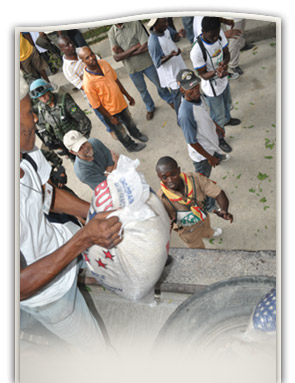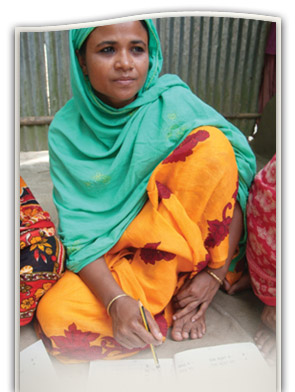

![]() he Adventist Development and Relief Agency (ADRA) was created by the Seventh-day Adventist Church as a way to follow Christ’s example: to bring hope to those in a world of poverty, hurt, and injustice. For more than 25 years ADRA’s ministry is one we share with all Christians who are inherently compelled to work for the empowerment of others and act as catalysts in social and economic change. In the past five years ADRA has experienced tremendous growth and change, but one abiding principle has remained constant—our belief that every woman, child, and man can and should be able to achieve his or her God-given opportunity for a better life.
he Adventist Development and Relief Agency (ADRA) was created by the Seventh-day Adventist Church as a way to follow Christ’s example: to bring hope to those in a world of poverty, hurt, and injustice. For more than 25 years ADRA’s ministry is one we share with all Christians who are inherently compelled to work for the empowerment of others and act as catalysts in social and economic change. In the past five years ADRA has experienced tremendous growth and change, but one abiding principle has remained constant—our belief that every woman, child, and man can and should be able to achieve his or her God-given opportunity for a better life.
ADRA invests in the potential of individuals by providing food and water, promoting health and disease prevention, establishing livelihoods, championing advocacy, responding to emergencies, and supporting literacy and education initiatives.
Through its international network of offices in more than 120 countries with more than 5,000 dedicated workers, ADRA is able to provide development assistance and respond to emergencies by working closely with thousands of local and international partners. This includes the United Nations, where the agency has held general consultative status since 1997, the highest status for humanitarian organizations.
ADRA is presently one of the leading humanitarian organizations in the world. Since 2005 more than 100 million people have received assistance through the hundreds of programs that ADRA has created. For several years ADRA has consistently received high marks for its humanitarian work and stewardship. As recently as 2009, ADRA ranked among the top 100 most valuable brand names out of 1.5 million nonprofit entities in the United States. In addition, ADRA continues to receive high marks from independent charity evaluators for transparency and financial accountability.

An ADRA worker distributes bags of rice in Haiti.
Providing Access to Food and Water
ADRA’s water, food, and agriculture programs not only help families to have access to life’s most basic needs; they also provide a way for them to find stability and thrive as a result of the quality of the assistance and training they receive.
The Aatha-Quaddai Food Security Initiative (BOFSI) is helping communities in arid central Chad have better access to food, improve crop yields, diversify agricultural production, and broaden livestock pools. Funded by USAID, this project, scheduled for completion in 2013, is worth $25 million.
In Bangladesh, where arsenic is commonly found in ground water sources, ADRA is implementing a project that will supply pure, arsenic-free water for more than 3,000 beneficiaries in the Manikganj district in central Bangladesh.
Improving Literacy
Literacy is the key that opens the door to growth, health, and development. But today, millions of people lack access to the education they need to be successful. ADRA seeks to empower individuals by providing literacy opportunities that will make a difference in their lives.
In 2008 ADRA pledged $1.5 million in new resources to improve women’s literacy and girls’ access to education worldwide, joining more than 70 organizations and numerous leaders from women’s faith, business, international development, and public policy communities, to announce a commitment to implement programs worth more than $1 billion to empower women to fight global poverty.
The same year, ADRA delivered $22 million worth of schoolbooks to schools and libraries in Africa, Latin America, and the Caribbean.
Establishing Livelihoods
ADRA gives people the right tools, which allows families to be an integral part of their own long-term development, providing the necessary training and financial investment to help someone open up a small business, learn math and business skills, and become self-sufficient and financially stable.
In eastern Democratic Republic of the Congo, ADRA’s $7.5 million JENGA project is helping more than 400,000 war returnees, among them many female-headed households, to increase crop production, expand livelihood options, and improve health and nutrition.

A woman in Bangladesh learns through a literacy program supported by ADRA.
Promoting Health
Health and disease prevention have a direct impact on the well-being and development of a community. This is why ADRA is implementing programs to reduce malaria, HIV and AIDS, tuberculosis, and waterborne diseases.
Since 2006 ADRA has provided some $43 million in HIV/AIDS assistance, benefiting more than 9 million people in 16 countries.
In 2007 ADRA took part in a $2 million grant announced by former first lady Laura Bush (United States) to fight malaria through the Together Against Malaria (TAM) campaign.
Protecting the Vulnerable
Millions of children and adults around the world are denied basic human rights and are subjected to sexual exploitation and violence. ADRA is committed to protecting the vulnerable and providing tangible opportunities for their development.
To advocate for the end of violence against women and girls, ADRA and the Women’s Ministries Department of the Seventh-day Adventist Church launched in 2009 the enditnow campaign, a global initiative that supports development programs empowering women and generating awareness about gender-based violence in communities around the world. Part of the initial phase of the campaign is to collect 1 million signatures from 200 countries that will be delivered to the United Nations.
Responding to Emergencies
When disasters strike, ADRA works to prevent further loss of life by responding quickly to evaluate the greatest needs, and then developing plans to get help to the areas where it is needed most. Often ADRA coordinates with local governments to provide medical care, food, water, and shelter to victims of tragedies.
Following the 2004 Asian tsunami, ADRA launched a massive emergency response that assisted more than 500,000 people in India, Thailand, Indonesia, and Sri Lanka. Today ADRA continues to work toward the long-term development of many communities affected by that disaster.
In the aftermath of Cyclone Nargis that struck Myanmar in 2008, ADRA responded by delivering rice, shelter materials, hygiene kits, medicines, and water treatment supplies. Within weeks, ADRA became the largest U.N. World Food Program (WFP) partner in the country, distributing more than 40 percent of WFP commodities nationally.
The Haiti earthquake prompted ADRA to deliver emergency aid to hundreds of thousands of affected Haitians. As part of the response, ADRA provided more than 20 million meals, clean water for 200,000 people a day, vaccinations for more than 148,000 children and adults, medical care, temporary shelter, and sanitation—and has been working for months to care for more than 20,000 displaced survivors in a camp in Port-au-Prince.
As a result of ADRA’s ministry, millions of people have seen God through the kind and compassionate actions of ADRA workers and volunteers. Today ADRA continues to represent the open and loving arms of Christ by comforting the poor and vulnerable of this world.